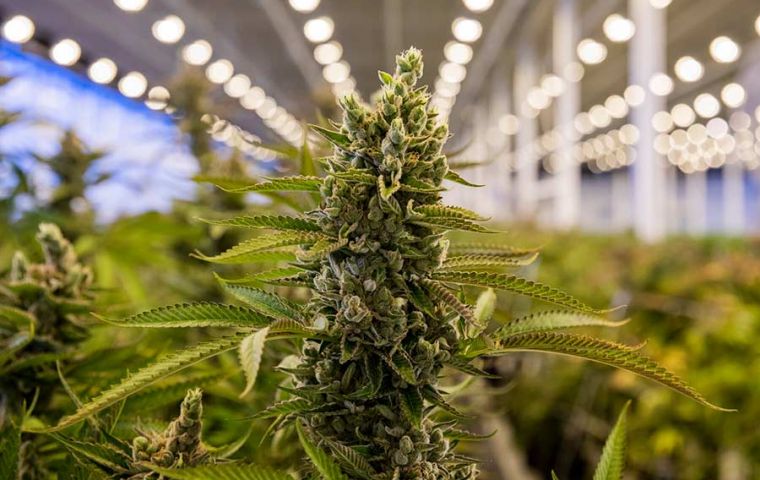MercoPress. South Atlantic News Agency
Cannabis developers eye Paraguay to further expand their business
 CPlant is also negotiating with Uruguay's government the authorization to grow and export psilocybin fungi for medical purposes
CPlant is also negotiating with Uruguay's government the authorization to grow and export psilocybin fungi for medical purposes As cannabis gradually transitions from a cultural drug to just an agricultural product like any other, Paraguay's unique conditions make it a destination of choice for those trying to develop the newly-legalized business, according to a report carried by the Buenos Aires daily Perfil.
Paraguay's unexpensive utilities in addition to the country's comparable low wages coupled with an already established pharmaceutical industry make it suitable to compete with marijuana-friendly countries such as Colombia and Uruguay.
According to Perfil, medical cannabis exporter CPlant Switzerland expects to buy over a licensed producer in Paraguay in early 2022 to grow high-THC flowers and derivatives for the company's Swiss laboratory, CEO Lucas Crivilone said.
If cannabis prices continue to fall, CPlant could move most of its cultivation from Uruguay to Paraguay, where operating costs are 50% lower, he added. In Paraguay, medical cannabis is legal since 2017. “We would go to Paraguay if the regulation accompanies us and the market prices allow us to have a substantially higher profit margin in Paraguay than Uruguay. We will aim to grow crops in Paraguay,” Crivilone told Perfil in a telephone interview.
Cannabis exporters are facing several years of falling prices as growing volumes of low-cost production from Mediterranean and Southern Hemisphere countries hit the market.
Production of marijuana for medicinal purposes is currently limited in Paraguay to 12 local investors who obtained licenses in 2020. Three of those companies are already supplying CBD oil and capsules to pharmacies and to the Paraguayan Health Ministry, Perfil explained.
CPlant plans to start growing both in Uruguay and Paraguay the flower with a high content of THC, the pricy psychoactive ingredient in marijuana. The company already produces cannabis for CBD in Uruguay, a substance that is advertised as having therapeutic effects. CPlant could grow up to 5 hectares of the high-THC flower in Paraguay by 2024, Crivilone said. The switch to THC occurs when the prices of CBD products drop.
CBD flower prices went down 20% in 2021 from the previous year, explained Crivilone, who expects to produce 15 to 25 tons of flowers in Uruguay this year, up from 9 tons in 2021. Sales will more than double to US $ 8 million due to new products and increased production, he added. Since 2019, Uruguay has shipped more than 32 metric tons of flowers, biomass, seeds, and medical products to countries such as Switzerland, Germany, and Portugal. CPlant obtains all its cannabis from 44 hectares cultivated by associate growers. The company provides seeds, licenses, and technical assistance.
“We are convinced that this will be the dominant model,” said Chief Strategy Officer Guido Husni. “Agriculture requires a lot of work and investment. We completely exited that part of the business to focus on sales and finished products.“
Founded by Argentine entrepreneurs Crivilone and Husni in 2018, CPlant ships the CBD-rich dried flower by air to a laboratory in Switzerland, where it is processed into packaged products for sale to distributors in Latin America and the EU. Sales of medicinal cannabis in Europe are expected to reach some US $ 2.6 billion in 2026 from an estimated US $ 270 million in 2021.
In November, CPlant began raising US $ 4 million in capital investment to finance projects that include product development, entry into Paraguay, and new distribution offices in Argentina, Brazil, and Slovenia. CPlant is also negotiating with Uruguay's government the authorization to grow and export psilocybin fungi for medical purposes, Crivilone said. ”Our focus now is on retail products and other compounds like THC and psilocybin fungi,” he said. (Source: Perfil)




Top Comments
Disclaimer & comment rulesCommenting for this story is now closed.
If you have a Facebook account, become a fan and comment on our Facebook Page!